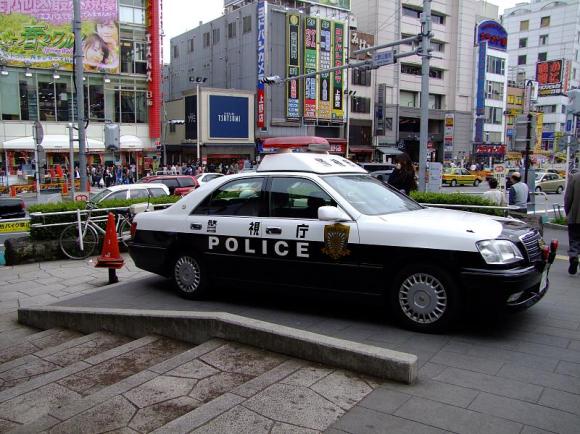
An investigation into the suicide of a police officer in a Tokyo police station has found that harassment from a superior contributed to his death. While the chief is now facing disciplinary action, it has again highlighted the problem of abuses of authority in Japanese workplaces, also known as ‘power harassment’, or pawahara in Japanese.
In February earlier this year a 44-year-old head patrol officer was found dead from a bullet wound to the head in the restroom of Kamata Police Station in Ōta Ward, Tokyo. His death was ruled a suicide.
The result of the police investigation into his death has found that since the previous spring, the 52-year-old chief had been continuously abusive towards many of the people working under him, including the patrol officer. The harassment included department personnel being severely rebuked for a lack of arrests from police questioning, and just the day before the officer took his own life his chief told him ‘You’re useless’ and pushed him for his resignation.
The police department has labeled this behaviour power harassment and found it to be a cause in the man’s suicide. The chief has faced disciplinary measures and a pay cut, and has now apologized to the family of the decreased. He has issued a statement saying ‘I was not aware that it was power harassment, but I am painfully aware of my responsibility in the matter.’ A statement from the police headquarters states, ‘We have dealt with this behaviour, which is inappropriate coming from a core member of the station’s staff, seriously. We will endeavour to create an environment where staff can perform their professional duties to the best of their abilities.’
This issue has brought yet more attention to a topic that has been in the spotlight in recent years in Japan. The word used in Japanese is ‘powahara’, a portmanteau of ‘power’ and ‘harassment’ in the same way that ‘sekuhara’ is used to express ‘sexual harassment’. In English we may be more used to the phrase ‘abuse of authority’, which refers to the same situation of when someone uses their position in an organization or workplace to bully and abuse those beneath them.
Power harassment may not necessarily occur more often in Japan than elsewhere, but the term was coined in Japan, and it has been highlighted as an endemic problem in many of the nations’ workplaces. However, many of the things which we might be quick to call an ‘abuse of authority’ are accepted practice in Japan, such as being made to perform tasks outside of job description, working overtime, and being berated for not measuring up to the boss’s seemingly impossible standards (usually in front of the whole office). Working in a Japanese office, I was often surprised at the way staff members would be rebuked publicly in front the rest of the workers, rather than in a private meeting with their boss. Yet as a foreigner, it’s difficult to condemn something which can be looked at as simply a different way of doing things. There are even plenty of workers who admire a powerful and authoritarian boss, despite the pressure it may put on them on a day-to-day basis.
Hopefully at least some good can come of this tragic case if it causes the police force and other prominent organizations to work harder towards stamping out this kind of damaging behaviour from their offices.
Source: NHK
Image: Wikimedia Commons

 As shorts are increasingly allowed in the Japanese workplace, could hairy legs be harassment?
As shorts are increasingly allowed in the Japanese workplace, could hairy legs be harassment? Rowr! This anti-power harassment poster is too sexy for its own good
Rowr! This anti-power harassment poster is too sexy for its own good Kumamoto Police sergeant reprimanded for making officers eat spicy instant noodles
Kumamoto Police sergeant reprimanded for making officers eat spicy instant noodles Inside the mind of a Japanese manager accused of “power harassment”
Inside the mind of a Japanese manager accused of “power harassment” Labor ministry employee power harassed by his own power harassment counselor
Labor ministry employee power harassed by his own power harassment counselor Yakuzen ramen restaurant in Tokyo is very different to a yakuza ramen restaurant
Yakuzen ramen restaurant in Tokyo is very different to a yakuza ramen restaurant Highest Starbucks in Japan set to open this spring in the Tokyo sky
Highest Starbucks in Japan set to open this spring in the Tokyo sky Skyscraper sized Pokémon cards to appear in Tokyo all year long in Tocho projection mapping event
Skyscraper sized Pokémon cards to appear in Tokyo all year long in Tocho projection mapping event The 10 most annoying things foreign tourists do on Japanese trains, according to locals
The 10 most annoying things foreign tourists do on Japanese trains, according to locals Tokyo Skytree turns pink for the cherry blossom season
Tokyo Skytree turns pink for the cherry blossom season Starbucks Japan unveils new sakura Frappuccino for cherry blossom season 2026
Starbucks Japan unveils new sakura Frappuccino for cherry blossom season 2026 Japanese zoo’s monkey bonds with Ikea stuffed orangutang following abandonment by mother[Video]
Japanese zoo’s monkey bonds with Ikea stuffed orangutang following abandonment by mother[Video] New Japanese menstrual product seeks to help women spot unidentified iron deficiencies
New Japanese menstrual product seeks to help women spot unidentified iron deficiencies Norwegian rocker with insane vocal range covers anime songs and more【Videos】
Norwegian rocker with insane vocal range covers anime songs and more【Videos】 Tokyo train little luxury showdown – Green Car vs. Kaiji, which is more comfortable?
Tokyo train little luxury showdown – Green Car vs. Kaiji, which is more comfortable? Starbucks Japan releases new sakura goods and drinkware for cherry blossom season 2026
Starbucks Japan releases new sakura goods and drinkware for cherry blossom season 2026 Naruto and Converse team up for new line of shinobi sneakers[Photos]
Naruto and Converse team up for new line of shinobi sneakers[Photos] Is Sapporio’s Snow Festival awesome enough to be worth visiting even if you hate the snow? [Pics]
Is Sapporio’s Snow Festival awesome enough to be worth visiting even if you hate the snow? [Pics] Japan has trams that say “sorry” while they ride around town…but why?
Japan has trams that say “sorry” while they ride around town…but why? Sakura Totoro is here to get spring started early with adorable pouches and plushies
Sakura Totoro is here to get spring started early with adorable pouches and plushies Poop is in full bloom at the Unko Museums for cherry blossom season
Poop is in full bloom at the Unko Museums for cherry blossom season Now is the time to visit one of Tokyo’s best off-the-beaten-path plum blossom gardens
Now is the time to visit one of Tokyo’s best off-the-beaten-path plum blossom gardens Playing Switch 2 games with just one hand is possible thanks to Japanese peripheral maker
Playing Switch 2 games with just one hand is possible thanks to Japanese peripheral maker Japan’s newest Shinkansen has no seats…or passengers [Video]
Japan’s newest Shinkansen has no seats…or passengers [Video] Foreigners accounting for over 80 percent of off-course skiers needing rescue in Japan’s Hokkaido
Foreigners accounting for over 80 percent of off-course skiers needing rescue in Japan’s Hokkaido Super-salty pizza sends six kids to the hospital in Japan, linguistics blamed
Super-salty pizza sends six kids to the hospital in Japan, linguistics blamed Foreign tourists in Japan will get free Shinkansen tickets to promote regional tourism
Foreign tourists in Japan will get free Shinkansen tickets to promote regional tourism Take a trip to Japan’s Dododo Land, the most irritating place on Earth
Take a trip to Japan’s Dododo Land, the most irritating place on Earth Archfiend Hello Kitty appears as Sanrio launches new team-up with Yu-Gi-Oh【Pics】
Archfiend Hello Kitty appears as Sanrio launches new team-up with Yu-Gi-Oh【Pics】 Survey asks foreign tourists what bothered them in Japan, more than half gave same answer
Survey asks foreign tourists what bothered them in Japan, more than half gave same answer Japan’s human washing machines will go on sale to general public, demos to be held in Tokyo
Japan’s human washing machines will go on sale to general public, demos to be held in Tokyo Starbucks Japan releases new drinkware and goods for Valentine’s Day
Starbucks Japan releases new drinkware and goods for Valentine’s Day We deeply regret going into this tunnel on our walk in the mountains of Japan
We deeply regret going into this tunnel on our walk in the mountains of Japan Studio Ghibli releases Kodama forest spirits from Princess Mononoke to light up your home
Studio Ghibli releases Kodama forest spirits from Princess Mononoke to light up your home Major Japanese hotel chain says reservations via overseas booking sites may not be valid
Major Japanese hotel chain says reservations via overseas booking sites may not be valid Put sesame oil in your coffee? Japanese maker says it’s the best way to start your day【Taste test】
Put sesame oil in your coffee? Japanese maker says it’s the best way to start your day【Taste test】 No more using real katana for tourism activities, Japan’s National Police Agency says
No more using real katana for tourism activities, Japan’s National Police Agency says Scalding your subordinate with tofu – definitely not proper police procedure
Scalding your subordinate with tofu – definitely not proper police procedure Osaka city employee suspended and demoted for verbally abusing boss
Osaka city employee suspended and demoted for verbally abusing boss Giri obligation chocolates seen as power harassment, more Japanese companies ban practice
Giri obligation chocolates seen as power harassment, more Japanese companies ban practice Saitama lieutenant calls subordinate’s lunch “garbage”, then loses job for eating garbage lunches
Saitama lieutenant calls subordinate’s lunch “garbage”, then loses job for eating garbage lunches Tokyo advertising company institutes mandatory lights-out time following employee suicide
Tokyo advertising company institutes mandatory lights-out time following employee suicide Why you should be worried if someone calls you “Uehara-san” in the Japanese workplace
Why you should be worried if someone calls you “Uehara-san” in the Japanese workplace New employee late to work in Japan shocks older coworkers by blaming the screw-up on “Mama”
New employee late to work in Japan shocks older coworkers by blaming the screw-up on “Mama” 20 signs that a woman should think about quitting the Japanese company she works for
20 signs that a woman should think about quitting the Japanese company she works for One in four surveyed Japanese workers admits to wanting to kill boss, Osaka quake helps show why
One in four surveyed Japanese workers admits to wanting to kill boss, Osaka quake helps show why Vietnamese workers get scolded by boss in Japan, retaliate by punching him in the head 【Video】
Vietnamese workers get scolded by boss in Japan, retaliate by punching him in the head 【Video】 Twitter manga shows why “Quit your job” isn’t such an easy solution for suicidal workers in Japan
Twitter manga shows why “Quit your job” isn’t such an easy solution for suicidal workers in Japan Five things that keep Japanese people chained to their jobs
Five things that keep Japanese people chained to their jobs Could Pen-Pineapple-Apple-Pen be the start of a new form of workplace harassment in Japan?
Could Pen-Pineapple-Apple-Pen be the start of a new form of workplace harassment in Japan? Yamato delivery man kicked and yelled at by older colleague in Japan【Video】
Yamato delivery man kicked and yelled at by older colleague in Japan【Video】 W.T.F. Japan: Top 5 strange Japanese office occurrences【Weird Top Five】
W.T.F. Japan: Top 5 strange Japanese office occurrences【Weird Top Five】